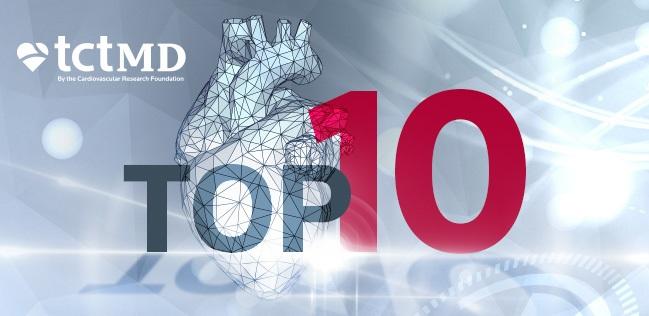TCTMD’s Top 10 Most Popular Stories for July 2019
Valves, inducible ischemia, an “urgent field notice,” SCOTHEART, and more SCCT news are among the month’s top stories.

Valves dominated the most-popular list this month, topped by a story about the urgent field notice sent by Edwards Lifesciences alerting operators to reports of burst balloons with the Sapien 3 Ultra. Other stories looked at valve positioning and future coronary access, fragmented TAVR care, life expectancy after SAVR, and MitraClip volumes. Among the top 3 was a 10-year follow-up study from MASS II addressing the link between inducible ischemia and CV outcomes, which in the words of one expert, serves to build “suspense” for the ISCHEMIA trial. Stories from the SCCT 2019 meeting, held earlier this month, round out the list.
1) Burst Balloons With Sapien 3 Ultra Prompt ‘Urgent Field Safety Notice’ and Canadian Recall
Edwards Lifesciences alerted operators about reports of burst balloons that have led to complications in retrieving the delivery system.
2) Evolut Valves: Initial Positioning Can Be Optimized for Future Coronary Access
It may be possible to deploy the valve in a coronary-access friendly position, experts say.
3) Baseline Ischemia Not Linked to 10-Year Events in Stable CAD: MASS II Analysis
Ischemia on exercise predicted neither MACE nor LV function changes in this long-running trial. Suspense builds for ISCHEMIA.
4) Doubling Down on SCOT-HEART: Mechanisms, Applicability, and Future Directions
SCOT-HEART results are boosting CT use, at least in the UK, but many still question how an imaging test could reduce events.
5) Fragmented TAVR Care Common, Linked to Death and Readmission
Living farther way and needing to drive longer were found to significantly increase care fragmentation.
6) Sudden, ‘Biologically Implausible’ Rise in Valsartan-Linked Neoplasms After 2018 Recall
Consumers “appeared to be the most susceptible to the widely covered recall, [but] healthcare providers were also influenced,” researchers found.
7) Life Expectancy Post-SAVR Varies by Age, Raising Questions for Treatment Timing
Knowing more about survival rates can help inform decision-making for physicians and patients, experts say.
8) Better Outcomes, Fewer Complications Among Higher-Volume MitraClip Sites
The institutional learning curve was evident up until 50 cases, but improvements were observed up to 200 procedures.
9) Time to Ease Up on Prior Authorization for PCSK9 Inhibitors?
Making the pathway to prescription less burdensome for the highest-risk patients could maximize benefit, experts argue.
10) Blood in Urine Carries Consequences for Patients on Antithrombotics
Hematuria is tied to an increase in ED visits and hospital admissions, and may even be a sign of otherwise silent bladder cancer.
TCTMD Opinions
Off Script: Through ‘Paclitaxelgate,’ Some Upsides to Uncertainty
This month we re-launched our Off Script physician blog, with insights from Sahil Parikh, MD, on the recent FDA advisory panel meeting.
Fellow Talk: Hemodynamics—the Forgotten Branch of Cardiology
Mesfer Alfadhel, MD, asks: given advancements in the field, is it time for fellows to spend more time learning how to do advanced hemodynamics?
Shelley Wood was the Editor-in-Chief of TCTMD and the Editorial Director at the Cardiovascular Research Foundation (CRF) from October 2015…
Read Full Bio

Comments